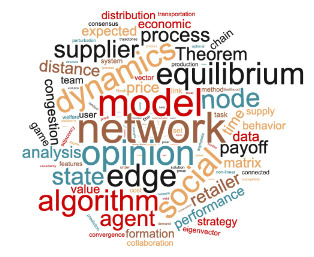For decades, scientists have studied opinion formation in social networks,
where information travels via word of mouth. The particularly interesting
case is when polar opinions—Democrats vs. Republicans or
iOS vs. Android—compete
in the network. The central problem is to design and analyze a model that
captures how polar opinions evolve in the real world.
In this work, we propose
a general non-linear model of polar opinion dynamics, rooted in several theories
of sociology and social psychology. The model's key distinguishing trait is that,
unlike in the existing linear models, such as DeGroot and Friedkin-Johnsen models,
an individual's susceptibility to persuasion is a function of his or her current
opinion. For example, a person holding a neutral opinion may be rather malleable,
while "extremists" may be strongly committed to their current beliefs. We also
study three specializations of our general model, whose susceptibility functions
correspond to different socio-psychological theories.
We provide a comprehensive
theoretical analysis of our nonlinear models' behavior using several tools from
non-smooth analysis of dynamical systems. To study convergence, we use non-smooth
max-min Lyapunov functions together with the generalized Invariance Principle.
For our general model, we derive a general sufficient condition for the convergence
to consensus. For the specialized models, we provide a full theoretical analysis
of their convergence—whether to consensus or disagreement. Our results are rather
general and easily apply to the analysis of other non-linear models defined over
directed networks, with Lyapunov functions constructed out of convex components.
@article{amelkin2017polar,
title={Polar Opinion Dynamics in Social Networks},
author={Amelkin, Victor and Bullo, Francesco and Singh, Ambuj K.},
journal={IEEE Transactions on Automatic Control},
year={2017},
volume={62},
issue={11},
publisher={IEEE},
doi={10.1109/TAC.2017.2694341}
}

 ]
]